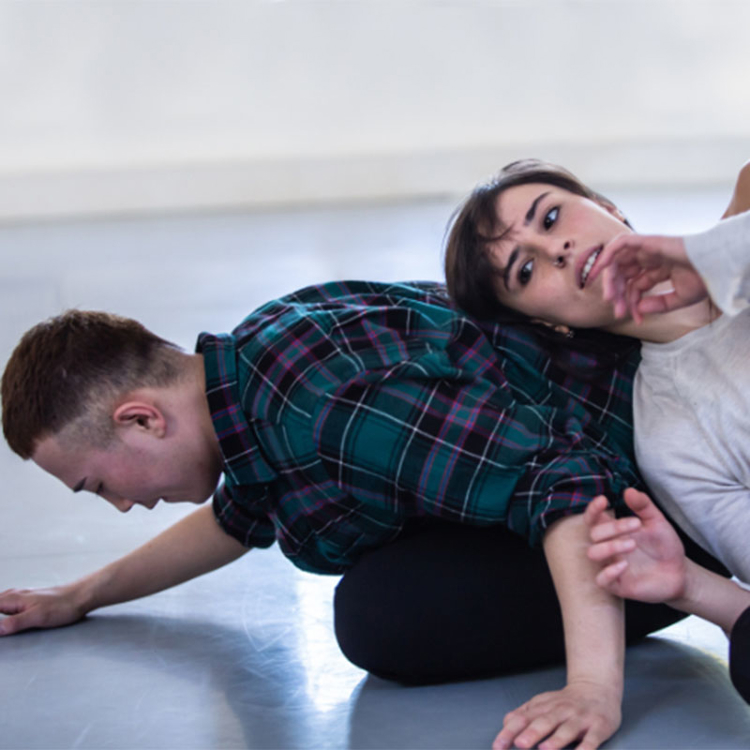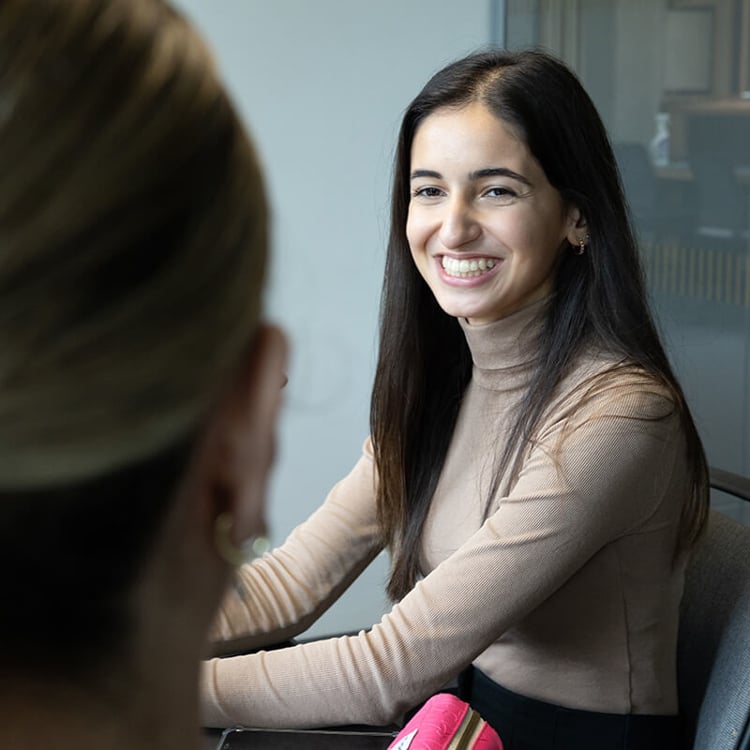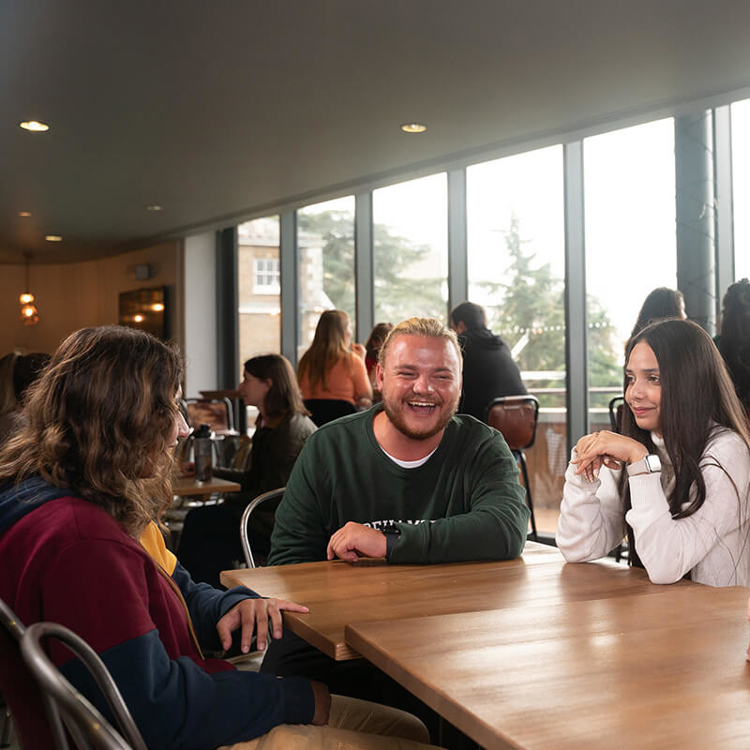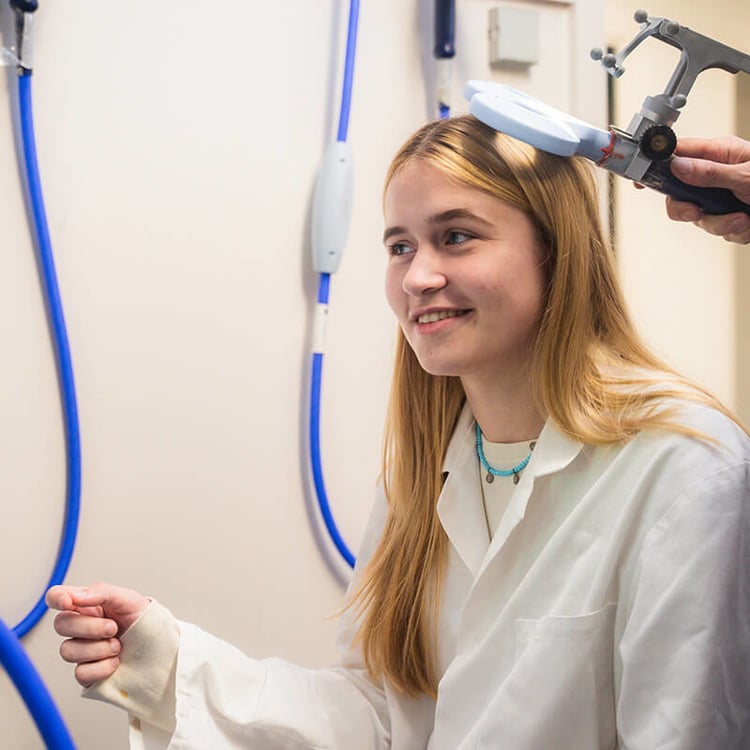Duration:
2 years (full-time)
3 years (part-time)
Number of credits:
180
Start date(s):
September 2026
Build a rewarding career as a professionally qualified registered dance movement psychotherapist. Graduates are eligible to register with the Association for Dance Movement Psychotherapy UK.
This programme is designed for people who have prior dance experience and professional or volunteering experience with people in need.
Dance movement psychotherapy is a relational process in which a client and therapist engage in an empathetic creative process using body movement and dance to assist the integration of emotional, cognitive, physical, social and spiritual aspects of self.
We believe that focusing on the creative potential of individuals in a relationship creates a sound ethical basis for psychotherapeutic work.
You will be taught by leading experts who will equip you with the skills, experience, and confidence to work as a dance movement psychotherapist.
On this professionally accredited MA, you will train to become a registered Dance Movement Psychotherapist (ADMP UK) through an immersive journey of embodied practice, clinical placement, and creative inquiry. You’ll develop the skills, confidence, and ethical awareness to work sensitively and effectively with individuals and communities across health, education, and social care settings.
You will learn through movement, relationship, and reflection—combining psychotherapeutic theory, creative expression, and critical thinking. As you grow into the role of therapist, you’ll be supported through personal therapy, experiential group work, clinical supervision, and peer collaboration.
This programme is built on the SAIL framework: supporting your development as an inclusive, sustainable, globally engaged, professionally focused, and digitally fluent practitioner. You’ll graduate with the confidence, creativity, and clinical competence to make a meaningful impact—ready to register, ready to practise, and ready to transform lives through movement.

Professional Registration with ADMP UK
All graduating students are eligible to apply for registration with the Association for Dance Movement Psychotherapy UK (ADMP UK), becoming fully qualified, registered Dance Movement Psychotherapists.
Registration opens opportunities to work across a variety of settings, including social services, special needs and educational provision, psychiatric services, probation and rehabilitation units, and forensic psychiatry.
Many graduates also create their own professional roles, designing and facilitating dance movement psychotherapy sessions tailored to the needs of their communities.
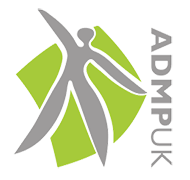
What Makes This Programme Unique?
- Professionally accredited pathway to ADMP UK registration, including supervised clinical hours and ethical training
- Embodied relational integrative framework combining DMP theory, movement practice, relational psychotherapeutic theories and arts-based research
- Develop your own DMP approach based on theoretical influences that align with your background, experience and values.
- Up to three diverse placements across health, education, and care sectors
- Only UK DMP course with cross-modality learning, studying alongside other arts and play therapists
- Innovative research outputs including dissertation and creative research film
- Strong focus on equality, inclusion and cultural humility in both curriculum and practice
- Personal therapy and embodied reflexivity embedded into the course structure
- High graduate employability with real-world clinical experience and sector-ready skills
- Sustainability-focused teaching on trauma-informed care, wellbeing, and ecological awareness
- Technology-enhanced learning using digital platforms, movement analysis, and creative AI-supported tools
Modules
This interdisciplinary module for students training in Art Psychotherapy, Music Therapy, Dance Movement Psychotherapy and Play Therapy will support you in developing your professional identity and preparing for placement practice. It provides comprehensive understanding of professional and ethical issues, including the therapeutic pathway, regulatory standards, diversity, equity, and sustainability, while fostering interdisciplinary communication skills and reflexive practice.
Your curriculum covers theoretical and clinical perspectives on human development (embodied, psychological, social, cultural, and biological) helping you to understand the experiences and needs of diverse service users. Emphasis is placed on trauma-informed approaches, culturally competent care, and critical analysis of health and mental health frameworks. Key professional skills, such as formulation, power dynamics, and ethical considerations, are integrated into the learning process.
This module introduces you to the theoretical foundations of Dance Movement Psychotherapy (DMP), integrating psychotherapeutic principles with embodied, movement-based practices. You will explore key models of change, embodiment, and relational process, critically examining how movement can support therapeutic engagement across diverse client needs and settings. As you engage with multicultural theories and inclusive frameworks, the module invites you to reflect on your own cultural narratives, developing awareness of identity, power, and social justice in therapeutic relationships.
This module marks your first immersive experience of clinical training and offers an integrated approach to professional development across three key areas: clinical placement and supervision, DMP clinical skills, and creative movement process. You will begin applying your learning in real-world settings through a supervised external placement, supported by weekly internal supervision. This space enables you to reflect on client work, develop ethical awareness, and build confidence as a beginning practitioner. In line with ADMP UK requirements, you will also engage in personal therapy, which underpins sustainable, safe practice and supports your emotional wellbeing as you navigate the complexity of clinical work.
This module marks a pivotal stage in your development as a Dance Movement Psychotherapist, supporting your transition from trainee to advanced trainee in preparation to becoming a professionally competent, registered practitioner. Through continued clinical placement with diverse client populations, weekly group supervision, and advanced practical and process-based learning, you will consolidate your theoretical understanding, therapeutic presence, and embodied skills. The module foregrounds relational complexity, cultural awareness, and ethical responsiveness as essential dimensions of safe, inclusive practice.
This module equips Arts and Play Therapies students with the critical knowledge and skills to engage in evidence-informed and interdisciplinary professional practice. You will be introduced to research practice and a variety of methodological research frameworks. Interdisciplinary expertise and contemporary research will be used to explore qualitative and quantitative methodologies, arts-based and participatory approaches. You will gain skills in evaluating and modifying your practice once qualified through audit, service evaluation and research. You will develop a critical understanding of ethical frameworks, the standards of proficiency for your practice regulator, and evidence-based practice in the health and wellbeing sectors. This teaching will assist you in gaining skills in planning and writing a research proposal, reviewing literature, selecting an appropriate methodological framework and methods and considering the ethical implications of your area of research interest.
This capstone module is the culmination of your MA Dance Movement Psychotherapy training and offers a unique opportunity to design and complete an original research project that weaves together your clinical practice, theoretical understanding, and embodied knowledge. Drawing from your placement experiences, personal identity, and professional interests, you will identify a relevant issue within Dance Movement Psychotherapy and explore it using ethical, somatic, and arts-based methodologies.
Careers
You will be fully prepared to enter the profession as a Dance Movement Psychotherapist, equipped with the skills and competencies required for registration with the Association for Dance Movement Psychotherapy UK (ADMP UK). Graduates have gone on to work in a wide range of settings, including:
- NHS mental health services, including CAMHS, adult, and older adult services
- Mainstream and specialist education, including SEND provision
- Community organisations, trauma services, and the charitable sector
- Hospices, palliative care, and neurodiverse support contexts
- Private and social enterprises, including creative arts therapy clinics
- Doctoral research and academic pathways (PhD study)
Career development is embedded throughout the programme to ensure you are workplace-ready. Up to three supervised clinical placements provide hands-on experience with diverse populations and service models, building professional confidence, resilience, and reflective practice. Assessments mirror professional tasks, such as session planning, risk assessment, case presentations, and movement facilitation, preparing you for real-world practice.
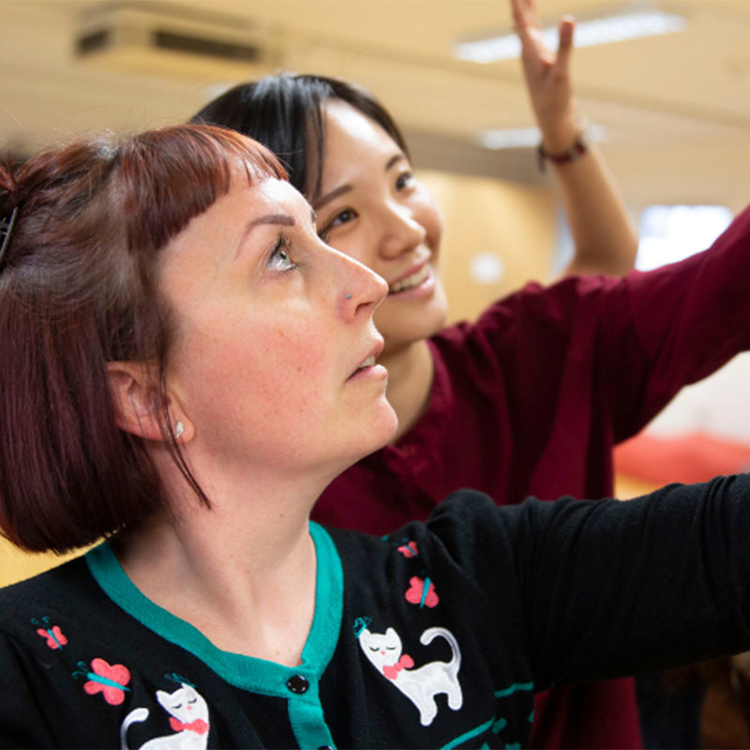
Learning and Assessment
How you’ll learn:
You will learn through a research-informed, student-centred approach that combines academic, embodied, and practice-based methods to develop your skills as an ethical, reflexive, and clinically competent psychotherapist. The programme is inclusive and responsive to diverse learner needs, offering movement-based learning, supervised practice, interactive seminars, reflective group work, research-led inquiry, and arts-based projects.
Experiential learning is central. Weekly movement labs, process groups, and seminars integrate improvisation, kinaesthetic empathy, and nonverbal communication. Peer-led sessions and skills groups support self-directed learning and confidence in therapeutic application. Theory and practice are linked throughout, with lectures explored through discussion and embodied exercises.
Clinical placements allow you to apply theory in practice. Up to three placements are supervised by ADMP UK-approved tutors, with tutorials at the start, midpoint, and end to support the development of clinical competencies in assessment, treatment planning, ethical decision-making, and professional conduct.
Learning is both independent and collaborative. Flipped classrooms, group projects, and independent research culminate in a Capstone Project combining a dissertation and an embodied research film. Technology such as Moodle, video analysis, movement capture, and digital storytelling supports accessibility, reflection, and creativity, while AI provides personalised guidance and feedback.

How you’ll be assessed:
You will be assessed through a variety of inclusive methods designed to prepare you for professional registration with ADMP UK. Assessments allow you to demonstrate learning in written, visual, oral, digital, and movement-based formats, supported by personalised feedback and tutorials. Tasks are carefully structured, with formative feedback, peer learning, and reflective practice embedded throughout. The ethical use of AI is encouraged as a tool for research and reflection rather than a substitute for professional judgement.
Assessment focuses on four key areas. Academic and theoretical knowledge is shown through critical analysis, case presentations, and vivas that connect theory to practice. Clinical and professional competence is demonstrated through placement portfolios, client assessments, simulated sessions, and safe practice presentations. Reflective and embodied practice includes reflexive writing, movement-based reflections, supervision reflections, and peer-led facilitation. Research and inquiry is evidenced through the capstone project, combining a dissertation and embodied research film, alongside arts-based presentations.
All placement components must be successfully completed to achieve the award, ensuring students meet ADMP UK standards in clinical practice, ethical conduct, and professional competence. Formative feedback is provided in classes, tutorials, supervision, and peer groups, while summative feedback is written, offering guidance for improvement and opportunities for follow-up tutorials.
To progress and graduate, students must demonstrate fitness to practise through placements, complete 675 clinical hours including at least 100 direct client contact hours, and engage in 80 hours of personal therapy over the course of the programme.
Short courses
We also offer weekend introductory courses, five-day Summer Schools, and 20-week part-time evening Foundation Courses, providing a valuable introduction to related professions.

Open days
Get a real taste of our campus, community and what it’s like to study at Roehampton
Applying
UK postgraduate students apply through our direct application system.
This course uses a gathered field approach to process applications. Find out more information on how we will process your application.
Application deadline: 11 February 2026.
Interview date(s): 25 February – 5 March 2026.
Specific entry requirements
Applicants will normally be required to hold a good honours degree (third class or above); in most cases this will be in a dance-related discipline or a clinically related discipline such as Dance, Psychology, Mental Health (Psychiatric) Nursing, or Social Work etc. Alternatively graduate level professional qualifications in appropriate disciplines such as Dance, Drama, Performing Arts, Occupational Therapy, Probation Officers, or Social Work, are also accepted.
International applicants and those unable to attend in person interviews must submit videos of dancing alone and in relationship to another prior to interview.
Applicants will be expected to have prior appropriate clinical experience of having worked within a setting and with clients appropriate to the programme. Normally applicants will be expected to have a minimum of 1 year prior clinical experience. This might include working with children, adults or older adults in the areas of learning disabilities, mental health, hospice care, dementia care, neuro-disability, homelessness, addictions etc (this is not an exhaustive list). This work can be on a voluntary or employed basis.
It is expected that applicants will have prior movement and dance movement experience either having worked professionally in a dance movement/performance context or having practiced continuously for a minimum of 2 years prior to training.
Ascertained from personal statement and/or interview: Knowledge and experience of at least two dance movement techniques/styles. Applicants should also demonstrate personal qualities considered important to train as a therapist, such as their capacity to form and maintain appropriate empathic relationships with clients. They should also demonstrate emotional literacy and robustness and an ability to be self- aware and open.
Applicants will be required to supply two completed references within their application; normally one of these should be able to comment on the applicant’s academic suitability and the other the applicant’s clinical suitability for the programme.
In addition to these requirements, all students must be prepared to enter mandatory on-going personal therapy for the duration of the programme.
Personal Statement
The typed personal statement (approx 500 words) should cover the following main areas:
- What has led you to wish to train as a therapist at this time?
- How does this connect with your dance background, experience and hopes for the future?
- what is your experience of how dance movement may enhance lives and facilitate change? (Specific reference to work or volunteering with vulnerable people is helpful).
- Mention relevant courses, conferences and reading, any meetings with dance movement or other therapists.
The personal statement is also an indication of how well you express yourself in writing and helps us to identify any needs for specific support and development before or during the programme.
General entry requirements
The following supporting documents must be uploaded to your applicant portal for the application to be considered complete.
Only applications completed before the application deadline will be reviewed for this programme.
- Academic Reference
- Professional Reference
- CV
- Degree Certificate (N/A if pending)
- Degree Transcript (N/A if pending)
- Dance Portfolio via link
- Passport photo page
- Work experience
International postgraduate students apply through our direct application system.
This course uses a gathered field approach to process applications. Find out more information on how we will process your application.
Application deadline: 11 February 2026.
Interview date(s): 25 February – 5 March 2026.
Specific entry requirements
Applicants will normally be required to hold a good honours degree (third class or above); in most cases this will be in a dance-related discipline or a clinically related discipline such as Dance, Psychology, Mental Health (Psychiatric) Nursing, or Social Work etc. Alternatively graduate level professional qualifications in appropriate disciplines such as Dance, Drama, Performing Arts, Occupational Therapy, Probation Officers, or Social Work, are also accepted.
International applicants and those unable to attend in person interviews must submit videos of dancing alone and in relationship to another prior to interview.
Applicants will be expected to have prior appropriate clinical experience of having worked within a setting and with clients appropriate to the programme. Normally applicants will be expected to have a minimum of 1 year prior clinical experience. This might include working with children, adults or older adults in the areas of learning disabilities, mental health, hospice care, dementia care, neuro-disability, homelessness, addictions etc (this is not an exhaustive list). This work can be on a voluntary or employed basis.
It is expected that applicants will have prior movement and dance movement experience either having worked professionally in a dance movement/performance context or having practiced continuously for a minimum of 2 years prior to training.
Ascertained from personal statement and/or interview: Knowledge and experience of at least two dance movement techniques/styles. Applicants should also demonstrate personal qualities considered important to train as a therapist, such as their capacity to form and maintain appropriate empathic relationships with clients. They should also demonstrate emotional literacy and robustness and an ability to be self- aware and open.
Applicants will be required to supply two completed references within their application; normally one of these should be able to comment on the applicant’s academic suitability and the other the applicant’s clinical suitability for the programme.
In addition to these requirements, all students must be prepared to enter mandatory on-going personal therapy for the duration of the programme.
Personal Statement
The typed personal statement (approx 500 words) should cover the following main areas:
- What has led you to wish to train as a therapist at this time?
- How does this connect with your dance background, experience and hopes for the future?
- what is your experience of how dance movement may enhance lives and facilitate change? (Specific reference to work or volunteering with vulnerable people is helpful).
- Mention relevant courses, conferences and reading, any meetings with dance movement or other therapists.
The personal statement is also an indication of how well you express yourself in writing and helps us to identify any needs for specific support and development before or during the programme.
General entry requirements
The following supporting documents must be uploaded to your applicant portal for the application to be considered complete.
Only applications completed before the application deadline will be reviewed for this programme.
- Academic Reference
- Professional Reference
- CV
- Degree Certificate (N/A if pending)
- Degree Transcript (N/A if pending)
- Dance Portfolio via link
- Passport photo page
- Work experience
Fees and funding
UK students
Tuition fees
| Entry date | MA (full-time) | MA (part-time) |
|---|---|---|
| September 2026 | £11,250 | £5,625 |
Prices shown are for the first year of your degree.
Additional costs to consider
Personal Therapy
Students must complete at least 80 hours of personal therapy during training—weekly for two years (FT) or three years (PT). Therapy is mandatory and must be with a registered/accredited therapist. Costs vary, so applicants should research fees on relevant websites.
DBS Check
Students must apply and pay for an enhanced Disclosure and Barring Service (DBS) check, even if previously completed. Subscription to the DBS Update Service is recommended to reduce costs.
Personal Indemnity Insurance
Students may need insurance during 2nd or 3rd-year placements, but only if not covered by the setting. Costs vary by provider.
Travel Costs
Students should budget for travel to campus, placements, and therapy. While local options may be available, this is not always guaranteed.
Professional Membership
All students must become student members of ADMP UK.
Placement Requirements
Some placements may require students to update or verify immunisation status, including covering the cost of vaccinations if needed.
Funding your studies
We also provide other ways to support the cost of living, including on-campus car parking, hardship support and some of the most affordable student accommodation and catering in London.
International students
Tuition fees
| Entry date | MA (full-time) | MA (part-time) |
|---|---|---|
| September 2026 | £18,980 | £9,490 |
Prices shown are for the first year of your degree.
Additional costs to consider
Personal Therapy
Students must complete at least 80 hours of personal therapy during training—weekly for two years (FT) or three years (PT). Therapy is mandatory and must be with a registered/accredited therapist. Costs vary, so applicants should research fees on relevant websites.
DBS Check
Students must apply and pay for an enhanced Disclosure and Barring Service (DBS) check, even if previously completed. Subscription to the DBS Update Service is recommended to reduce costs.
Personal Indemnity Insurance
Students may need insurance during 2nd or 3rd-year placements, but only if not covered by the setting. Costs vary by provider.
Travel Costs
Students should budget for travel to campus, placements, and therapy. While local options may be available, this is not always guaranteed.
Professional Membership
All students must become student members of ADMP UK.
Placement Requirements
Some placements may require students to update or verify immunisation status, including covering the cost of vaccinations if needed.
Funding your studies
We also provide other ways to support the cost of living, including on-campus car parking, hardship support and some of the most affordable student accommodation and catering in London.


